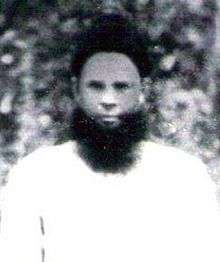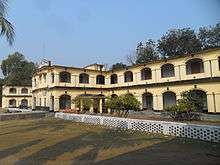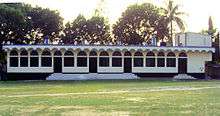Ahmed Hossain
Ahmed Hossain (1896–1961), Minister for Agriculture, Forest and Fisheries department in Huseyn Shaheed Suhrawardy's Cabinet 1946/47, Chairman of Rangpur District Board (Undivided Bengal),[1] Minister for Agriculture in East Pakistan in Abu Hossain Sarkar's cabinet 1955-56.[2] Represented his Shagata and Fulchari constituency, of Gaibandha District as MLA and MP from 1937 to 1958.
Ahmed Hossain | |
|---|---|
 Ahmed Hossain | |
| Born | 1896 |
| Died | 19 May 1961 |
Early life
Ahmed Hossain was born in Jalaltair village, Mahimaganj, Rangpur district on 7 March 1896. Hossain passed his Matriculation examination from Sonatola High School and obtained a Law Degree from the Aligarh Muslim University.[3]

Independence movement
Hossain joined the All India Congress Party and was fully committed to Mahatma Gandhi's non-cooperation movement (1920), canvassing support for the Congress Agenda all over north Bengal, particularly in the Rangpur district. When the Muslim League was formed, he joined it and contested the 1937 General Election as a Muslim League candidate and became an elected member of the Bengal Legislative Assembly.[4]

He ran in the Indian General Election of 1946 as a Muslim League candidate and became a member of the Bengal Legislative Assembly. He was given the ministerial post for the Agriculture, Forest and Fisheries department under the Chief Minister-ship of Huseyn Shaheed Suhrawardy. In 1947 Bengal was partitioned in the partition of Bengal along religious lines. The Muslim majority East Bengal joined with Pakistan. Khawaja Nazimuddin and Nurul Amin formed a Muslim government in Dhaka East Pakistan. Ahmed Hossain remained a Muslim League MLA.[3]
During the 1952 Language movement Hossain resigned from the Muslim League and joined the newly formed United Front Party led by Fazlul Huq, Maulana Bhashani and Hueyn Shaheed Suhrawardy. In 1954, Hossain was elected to the East Pakistan national assembly as a United Front Member.[5]

Ahmed Hossain was a philanthropist and interested in promoting Muslim education in Rangpur. He established an Alia Madrasa at Mahimaganj in 1939, which was particularly significant as at the time there were only three other Alia madras in the whole of undivided Bengal. A newly built student hall, the "Ahmed Hossain Student Hall" has been dedicated in his honour. Hossain was also responsible for building a high school and a Mosque in Mahimaganj in 1939 and 1945 respectively. In 1950 Ahmed Hossain introduced Laws against catching fish eggs, small and spawning fish to provide for the conservation and development of propagation of fish stock.[6] Ahmed Hossain continued to represent his constituency as an MP until Ayub Khan declared Martial Law in Pakistan in 1958.[5]
Death
Ahmed Hossain died at the age of 65 on Friday 19 May 1961.
References
- Rahim, Enaytur and Rahim, Joyce L, (2000). "Bengal politics the documents of the Raj (1944/47)", p.143, University Press Limited, Dhaka. ISBN 9840515004
- "Sarkar, Abu Hossain - Banglapedia". en.banglapedia.org. Retrieved 25 March 2016.
- Sufi, Motahar Hussain (2007). "Rangopurer Barannyo Baktittyo" (Renowned Personalities of Greater Rangopur), p.291, Rangopur Research Institute (Bengali edition)
- Majid, Shah Abdul (2009) "Colourful District of Rangpur", p89, ISBN 9789843304315 (Bengali edition)
- Sufi, Motahar Hussain (2007). "Rangopurer Barannyo Baktittyo" (Renowned Personalities of Greater Rangopur), p.292, Rangopur Research Institute (Bengali edition)
- "Protection and Conservation of Fish Act, 1950 (East Bengal Act No. XVIII of 1950)". Bdlaws.minlaw.gov.bd. 18 May 1950. Retrieved 29 March 2013.